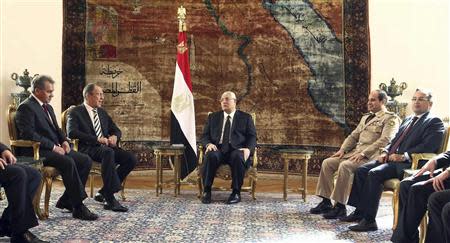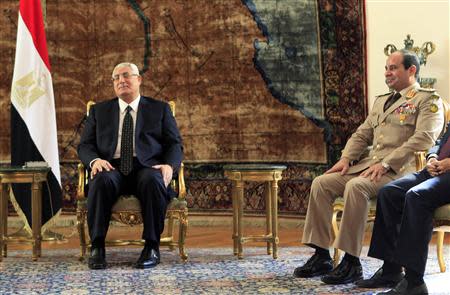Egypt's Sisi sees new defense cooperation with Russia
By Tom Perry and Maggie Fick CAIRO (Reuters) - Egypt's top general hailed a new era of defense cooperation with Moscow on Thursday during a visit by Russian officials, sending a message to Washington after it suspended some military aid. Relations between Cairo and the United States deteriorated after the army overthrew Islamist President Mohamed Mursi on July 3. Last month, Washington announced it would withhold deliveries of some military and economic aid pending progress on democracy. The visit to Cairo by Russia's defense and foreign ministers was billed by both sides as historic, although the delegation from Moscow left without announcing any major agreements. And playing down speculation of a big shift in Egyptian foreign policy, defined by close ties with Washington for more than three decades, Foreign Minister Nabil Fahmy said Russia was not meant to be a "substitute" for anyone. Egypt and the Soviet Union were close allies until the 1970s, when Cairo moved closer to the United States, which brokered its 1979 peace deal with Israel. General Abdel Fattah al-Sisi, Egypt's army chief and defense minister, told his Russian counterpart, Sergei Shoigu, the visit indicated the continuation of "historic strategic relations via starting a new era of constructive, fruitful cooperation on the military level", the state news agency reported. Shoigu and Sisi talked about strengthening military relations between the countries, the agency said. "It's meant to send a message to say Egypt has options, and that if the United States wishes to maintain its strategic alliance with Egypt, it will have to drop the conditions it attaches to the military aid," said Yasser El-Shimy, Egypt analyst with the International Crisis Group. Washington has said it would consider resuming some of the suspended aid depending on Egypt's progress in following the interim government's plans to hold elections - a plan the government says it is committed to seeing through. Seeking to mend fences with Egypt, U.S. Secretary of State John Kerry expressed guarded optimism about a return to democracy during a November 3 visit to Cairo. Egyptian Deputy Prime Minister Ziad Bahaa El-Din, who visited Washington last week, said there had been "a change of understanding" there about Egypt - remarks suggesting U.S. officials are now more sympathetic to the Cairo government's view of events around the elected Islamist president's ouster. "In the context of ... a 30-year relationship, I don't think we have much to worry about at this stage," Bahaa El-Din said in an address to the American Chamber of Commerce in Egypt, adding that he was "very pleased" with the results of his visit. "WE ARE READY TO HELP" A Western diplomat in Cairo said the prospect of the United States resuming aid early next year was one factor diminishing the chances of a major new defense deal with Moscow. Analysts have also questioned how the heavily indebted Egyptian state would pay for new armaments, saying it would probably need more financial support from Gulf allies that have pledged $12 billion in help since Mursi's downfall. There is also a question mark over how Russian armaments could be integrated with Egypt's U.S.-built weapons systems. Egypt receives around $1.3 billion in military aid from the United States each year. On October 9, Washington announced it would withhold deliveries of tanks, fighter aircraft, helicopters and missiles as well as $260 million in cash aid pending progress by the military-installed government towards democracy and human rights. Sisi deposed Mursi on July 3 following mass protests against his Muslim Brotherhood-backed rule. The general has emerged as a popular figure among many Egyptians pleased to see the end of Mursi's administration. Many analysts believe he would likely win a presidential election due next year were he to run. State TV used the Russian visit to recall the era of President Gamal Abdel Nasser, the popular army colonel who led Egypt after the army overthrew the monarchy in 1952. Nasser forged close ties with the Soviet Union that continued until the 1970s. The main state TV station broadcast archive footage of Nasser's meetings with Soviet officials. Fahmy, the Egyptian foreign minister, said Cairo was looking to "reactivate" an old relationship with Russia. Egypt and Russia would reconvene a joint governmental committee aimed at promoting economic cooperation, the ministers said. "We are ready to help Egypt in all the fields where it seeks cooperation," Russian Foreign Minister Sergei Lavrov said. He said Russia could assist Egypt in modernizing projects built with Soviet help in the Nasser era. (Additional reporting by Hadeel Al Shalchi; Writing by Tom Perry; Editing by Andrew Roche)



